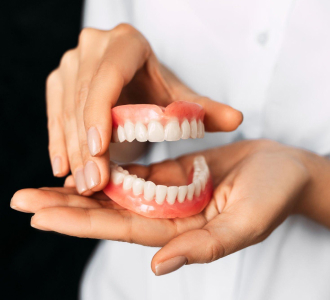
What are Dentures?
Dentures are a type of artificial teeth used to replace missing teeth. They are typically made of acrylic resin, metal, and ceramic and are custom-fitted to the wearer's mouth.Dentures can be either full or partial, depending on the number of teeth being replaced.Full dentures replace all of the teeth in one or both jaws, while partial dentures replace just some of the teeth.
- • Conventional Full Dentures
These are complete dentures that are placed in the mouth after the remaining teeth have been removed and the tissues have healed.
- • Immediate Full Dentures
These are complete dentures that are placed in the mouth immediately after the remaining teeth are removed.
- • Partial Dentures
These dentures are used when some natural teeth remain in the upper or lower jaw.They use a metal framework that attaches to the natural teeth and holds the denture in place.
- • Overdentures
These are dentures that fit over existing teeth or dental implants. They are supported by the natural teeth, dental implants, or a combination of both.
- • Flexible Partial Dentures
These dentures are made of a flexible material and are used when some natural teeth remain in the upper or lower jaw. They are more comfortable than traditional partial dentures.
- • Implant-Supported Dentures
These dentures are supported by dental implants that are surgically placed in the jawbone. They are more stable and secure than traditional dentures.
- • Consultation
During your first appointment, our dentist will assess your oral health, make recommendations, and discuss the denture options available to you.
- • Impression
To ensure a proper fit, our dentist will take an impression of your gums and jawbone.They may also take X-rays to assess your jawbone’s health.
- • Wax Try-in
A wax replica of your denture is created, so that you can try it in and evaluate its fit and appearance.
- • Fabrication
After any necessary adjustments are made, your denture will be fabricated.
- • Flexible Partial Dentures
These dentures are made of a flexible material and are used when some natural teeth remain in the upper or lower jaw. They are more comfortable than traditional partial dentures.
- • Delivery
Once your denture is complete, our dentist will check its fit and placement.They will also provide instructions on how to care for your denture and what to expect during the adjustment period.
- • Clean your dentures every day with a soft-bristled toothbrush and a mild dish soap or denture cleaner.
- • Soak your dentures overnight in a denture-cleaning solution or in water.
- • Rinse your dentures thoroughly before putting them back in your mouth.
- • Handle your dentures carefully when cleaning them.
- • Visit your dentist regularly to have your dentures checked and adjusted.
- • Avoid using whitening toothpaste, abrasive toothpastes, or mouthwashes that contain alcohol, as they can damage your dentures.
- • Brush your dentures every day to keep them clean and free of any debris.
- • Soak your dentures in a special cleaning solution when you are not wearing them.
- • Rinse your dentures after eating to remove any food particles.
- • Visit our dentist regularly for check-ups and professional cleaning.
- • Handle your dentures carefully to avoid breakage.
- • Use a soft-bristled toothbrush to clean your dentures.
- • Don’t use hot water to soak your dentures as it may cause them to warp.
- • Don’t use abrasive cleaners such as bleach or harsh chemicals.
- • Don’t use toothpaste to clean your dentures as it may be too abrasive.
- • Don’t attempt to adjust your dentures yourself.
- • Don’t wear your dentures if they are loose, cracked, or broken.
Cost of Dentures
The cost of dentures can vary depending on the type of denture and the complexity of the treatment.



